Title 48
SECTION 9904.414-63
9904.414-63 Effective date.
9904.414-63 Effective date.This Standard is effective as of April 17, 1992.
Appendix A to 9904.414 - Instructions for Form CASB CMF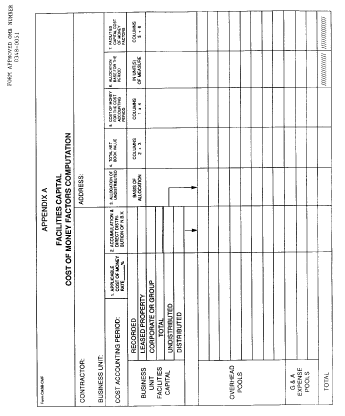 Purpose
Purpose
The purpose of this form is to (a) accumulate total facilities capital net book values allocated to each business unit for the contractor cost accounting period, and (b) convert those values to facilities capital cost of money factors applicable to each overhead or G&A expense allocation base employed within a business unit.
BasisAll data pertain to the cost accounting period for which the contractor prepares overhead and G&A expense allocations. The cost of money computations should be compatible with those allocation procedures. More specifically, facilities capital values used should be the same values that are used to generate depreciation or amortization that is allowed for Federal Government contract costing purposes; land which is integral to the regular operation of the business unit shall be included.
Applicable Cost of Money Rate (Col. 1)Enter here the rate as computed in accordance with 9904.414-50(b).
Accumulation and Direct Distribution of Net Book Value (Col. 2) Recorded, Leased Property, Corporate.The net book value of facilities capital items in this column shall represent the average balances outstanding during the cost accounting period. This applies both to items that are subject to periodic depreciation or amortization and also to such items as land that are not subject to periodic write-offs. Unless there is a major fluctuation, it will be adequate to ascertain the net book value of these assets at the beginning and end of each cost accounting period, and to compute an average of those two sets of figures. “Recorded” facilities are the facilities capital items owned by the contractor, carried on the books of the business unit, and used in its regular business activity. “Leased property” is the capitalized value of leases for which constructive costs of ownership are allowed in lieu of rental costs under Government procurement regulations. Corporate or group facilities are the business unit's allocable share of corporate-owned and leased facilities. The net book value of items of facilities capital which are held or controlled by the home office shall be allocated to the business unit on a basis consistent with the home office expense allocation.
Distributed and Undistributed.All facilities capital items that are identified in the contractor's records as solely applicable to an organizational unit corresponding to a specific overhead, G&A or other indirect cost pool which is used to allocate indirect costs to final cost objectives, are listed against the applicable pools and are classified as “distributed.” “Undistributed” is the remainder of the business unit's facilities capital. The sum of “distributed” and “undistributed” must also correspond to the amount shown on the “total” line.
Allocation of Distributed.List in the narrative column all the overhead and G&A expense pools to which “distributed” facilities capital items have been allocated. Enter the corresponding amounts in (Col. 2). The sum of all the amounts shown against specific overhead and G&A expense pools must correspond to the amount shown in the “distributed” line.
Allocation of Undistributed (Col. 3)Business unit “undistributed” facilities are allocated to overhead and the G&A expense pools on any reasonable basis that approximates the actual absorption of depreciation or amortization of such facilities. For instance, the basis of allocation of undistributed assets in each business unit between; e.g., engineering overhead pool and the manufacturing overhead pool, should be related to the manner in which the expenses generated by these assets are allocated between the two overhead pools. Detailed analysis of this allocation is not required where essentially the same results can be obtained by other means. Where the cost accounting system for purposes of Government contract costing uses more than one “charging rate” for allocating indirect costs accumulated in a single cost pool, one representative base may be substituted for the multiplicity of bases used in the allocation process. The net book value of service center facilities capital items appropriately allocated should be included in this column. The sum of the entries in Column 3 is equal to the entry in the undistributed line, Column 2.
A supporting work sheet of this allocation should be prepared if there is more than one service center or other similar “intermediate” cost objective involved in the reallocation process.
Alternative Allocation Process - As an alternative to the above allocation process all the undistributed assets for one or more service centers or similar intermediate cost objectives may be allocated to the G&A expense pool. Consequently, the cost of money for these undistributed assets will be distributed to the final cost objectives on the same basis that is used to allocate G&A expense. This procedure may be adopted for any cost accounting period only when the contracting parties agree (a) that the depreciation or amortization generated by these undistributed assets is immaterial, or (b) that the results of this alternative procedure are not likely to differ materially from those which would be obtained under the “regular” allocation process described previously.
Total Net Book Value (Col. 4)The sum of Columns 2 and 3. The total of this column should agree with the business unit's total shown in Column 2.
Cost of Money for the Cost Accounting Period (Col. 5)Multiply the amounts in Column 4 by the percentage rate in Column 1.
Allocation Base for the Period (Col. 6)Show here the total units of measure used to allocate overhead and G&A expense pools (e.g., direct labor dollars, machine hours, total cost input, etc.). Include service centers that make charges to final cost objectives. Each base unit-of-measure must be compatible with the bases used for applying overhead in the Federal Government contract cost computation. The total base unit of measure used for allocation in this column refers to all work done in an organizational unit associated with the indirect cost pool and not to Government work alone.
Facilities Capital Cost of Money Factors (Col. 7)The quotients of cost of money for the cost accounting period (Col. 5) separately divided by the corresponding overhead or G&A expense allocation bases (Col. 6). Carry each computation to five decimal places. This factor represents the cost of money applicable to facilities capital allocated to each unit of measure of the overhead or G&A expense allocation base.
Appendix B to 9904.414 - Example - ABC CorporationABC Corporation has a home office that controls three operating divisions (Business Units A, B & C). The home office includes an administrative computer center whose costs are allocated separately to the business units. The separate allocation conforms to the requirements specified in the Cost Accounting Standard No. 403. Tables I through VI deal with home office expense allocations to business units.
The A Division is a business unit as defined by the CASB, and it uses one engineering and one manufacturing overhead pool to accumulate costs for charging overhead to final cost objectives. In addition, the indirect cost allocation process also uses two “service centers” with their own indirect cost pools: Occupancy and technical computer center.
The costs accumulated in the occupancy pool are allocated among manufacturing overhead, engineering overhead, and the technical computer center on the basis of floor space occupied. The costs accumulated in the technical computer center cost pool are allocated to users on the basis of a CPU hourly rate. Some of these allocations are made to engineering or manufacturing overhead while others are allocated direct to final cost objectives.
At the business unit level, all the indirect expense incurred is regarded either as an engineering or manufacturing expense. Thus the sole item that enters into the business unit G&A expense pool is the allocation received by the A Division from the home office.
Operating results for the A Division are given in Table VII. Facilities capital items for the division are given in Table IX.
The example is based on a single set of illustrative contract cost data given in Table VIII. Since two methods, the “regular” and the “alternative” method, are potentially available for computing cost of money on facilities capital items two sets of different results can be considered.
In addition, total cost input is used in the example as the allocation base for the G&A expense. Two variations of this example have been prepared to illustrate the impact of excluding or including cost of money from total cost input. Variation I, summarized in Table XIII, excludes cost of money from the cost input allocation base. Variation II, summarized in Tables XVII and XVIII, includes cost of money in the cost input allocation base.
Throughout the example, where appropriate, cross references have been made to the text of the relevant parts of the Standard.
Variation I - Total Cost Input Allocation Base Excludes Cost of Money
Table I - Net Book Value of Home Office Facilities Capital
| Dec. 31, 1974 | Dec. 31, 1975 | |
|---|---|---|
| Administrative computer center facilities capital | $550,000 | $450,000 |
| Other home office facilities capital | 420,000 | 380,000 |
| Total | 970,000 | 830,000 |
The assets in the above table generate allowable depreciation or amortization, as explained in Instructions for Form CASB CMF (Basis). Thus they should be included in the asset base for cost of money computation.
Table II - Home Office Facilities Capital Annual Average Balances
| Administrative computer center facilities capital | $500,000 |
| Other home office facilities capital | 400,000 |
| Total | 900,000 |
The above averages are based on data in Table I computed in accordance with the criteria in Instructions for Form CASB CMF (Recorded, Leased Property, Corporate).
$970,000 + $830,000 = $1,800,000 12 = $900,000
Table III - Home Office Depreciation and Amortization for 1975
| Administrative computer center facilities capital | $100,000 |
| Other home office facilities capital | 40,000 |
| Total | 140,000 |
Table IV - Allocation of ABC Home Office Expenses to Divisions (Business Units)
| Total expense | Allocation of business units | |||
|---|---|---|---|---|
| A | B | C | ||
| Administrative computer center | $1,800,000 | $900,000 | $900,000 | |
| Other home office | 4,800,000 | 2,400,000 | 1,200,000 | 1,200,000 |
| Total | 6,600,000 | 3,300,000 | 2,100,000 | 1,200,000 |
The above allocation is carried out in accordance with CAS 403. The expense allocated to individual business units above includes depreciation and amortization as reflected in Table V.
Table V - Depreciation and Amortization Component of ABC Home Office Expense
| Total depreciation and amortization expense | Allocation of business units | |||
|---|---|---|---|---|
| A | B | C | ||
| Administrative computer center | $100,000 | $50,000 | $50,000 | |
| Other home office | 40,000 | 20,000 | 10,000 | 10,000 |
| Total | 140,000 | 70,000 | 60,000 | 10,000 |
(a) Depreciation and amortization allocation in Table V converted to percentages.
| Total depreciation and amoritzation expense (in percent) | Allocation of business units (in percent) | |||
|---|---|---|---|---|
| A | B | C | ||
| Administrative computer center | 100 | 50 | 50 | |
| Other home office | 100 | 50 | 25 | 25 |
(b) Application of percentages in (a) to average net book values in Table II, in accordance with criteria in Instructions for Form CASB CMF (Recorded, Leased Property, Corporate).
| Total net book value | Allocation of business units | |||
|---|---|---|---|---|
| A | B | C | ||
| Administrative computer center facilities capital | $500,000 | $250,000 | $250,000 | |
| Other home office facilities capital | 400,000 | 200,000 | 100,000 | $100,000 |
| Total | 900,000 | 450,000 | 350,000 | 100,000 |
Table VII - “A” Division 1975 Operating Results
| Total cost input and other work G.&A. | Fixed-price CAS-covered contract | Cost reimbursement CAS-covered contracts | Commercial and other work | |
|---|---|---|---|---|
| Direct material: | ||||
| Purchased parts | $2,000,000 | $100,000 | $100,000 | $1,800,000 |
| Subcontract items | 21,530,000 | 11,750,000 | 7,205,000 | 2,575,000 |
| Total | 23,530,000 | 11,850,000 | 7,305,000 | 4,375,000 |
| Director labor and overhead: | ||||
| Engineering labor | 2,000,000 | 1,500,000 | 500,000 | |
| Engineering overhead (80 pct of direct engineering labor) | 1,600,000 | 1,200,000 | 400,000 | |
| Manufacturing labor | 3,000,000 | 1,200,000 | 200,000 | 1,600,000 |
| Manufacturing overhead (200 pct of direct management labor) | 6,000,000 | 2,400,000 | 400,000 | 3,200,000 |
| Other direct charges: | ||||
| Technical computer center direct charge 2,280 h at $250/h | 570,000 | 200,000 | 370,000 | |
| Total cost input (excluding cost of money) | 36,700,000 | 18,350,000 | 9,175,000 | 9,175,000 |
| G. & A. (8.99 pct of cost input) | 3,300,000 | 1,650,000 | 825,000 | 825,000 |
| Total | 40,000,000 | 20,000,000 | 10,000,000 | 10,000,000 |
Table VIII - Cost Data for the Contract
| Purchased parts | $85,000 |
| Subcontract items | 990,000 |
| Technical computer time 280 h at $250/h | 70,000 |
| Engineering labor | 330,000 |
| Engineering overhead at 80 pct | 264,000 |
| Manufacturing labor | 1,210,000 |
| Manufacturing overhead at 200 pct | 2,420,000 |
| Total cost input (excluding cost of money) | 5,369,000 |
| G & A. at 8.99 pct | 483,000 |
| Total cost input and G. & A. (excluding cost of money) | 5,852,000 |
Average net book values are computed in accordance with Instructions to Form CASB CMF. Average figures only are given, the underlying beginning and ending balances for 1975 have not been reproduced.
| Name of indirect cost pool the asset is associated with | Average net book value | Annual depreciation |
|---|---|---|
| Engineering overhead | $320,000 | $40,000 |
| Manufacturing overhead | 4,500,000 | 900,000 |
| Technical computer center | 450,000 | 90,000 |
| Occupancy | 3,000,000 | 200,000 |
| Facilities capital recorded by division A (see Form CASB CMF instructions for description of recorded) | 8,270,000 | 1,230,000 |
| Allocated from home office, table VI | 450,000 | |
| Total division A | 8,720,000 |
(a) Occupancy Pool Assets. Total occupancy pool expenses are assumed to be $1,000,000 of which $200,000 is depreciation per Table IX. Allocation of the $3,000,000 net book value of assets per Table IX is performed on the basis of floor space utilization.
| Indirect cost pool | Occupancy expense and depreciation allocation | Percent of total floor space utilized | Asset allocation |
|---|---|---|---|
| Engineering | $200,000 | 20 | $600,000 |
| Manufacturing | 750,000 | 75 | 2,250,000 |
| Technical computer | 50,000 | 5 | 150,000 |
| Total | 1,000,000 | 100 | 3,000,000 |
(b) Technical Computer Center Assets. Total technical computer center expenses for the year are assumed to be $770,000 including $90,000 depreciation per Table IX and $50,000 charge from the occupancy pool per paragraph (a) of this table. A charging rate of $250 per hour is computed assuming a total of 3,080 chargeable CPU hours per annum. The net book value of assets amounting to $600,000 ($450,000 per Table IX plus the $150,000 allocated per (a) above) is allocated on the basis of CPU hours utilized.
| Overhead pool or cost objective | Hours charged | Amount charged | Percent | Asset allocation |
|---|---|---|---|---|
| Fixed price contracts, table VII | 800 | $200,000 | 26 | $156,000 |
| Cost reimbursement contracts, table VII | 1,480 | 370,000 | 48 | 288,000 |
| Engineering overhead pool | 800 | 200,000 | 26 | 156,000 |
| Total | 3,080 | 770,000 | 100 | 600,000 |
(c) Summary of Undistributed Facilities Capital Allocation. Undistributed (per Table IX).
| Technical computer center | $450,000 |
| Occupancy | 3,000,000 |
| Total | 3,450,000 |
Distribution per paragraph (a) or (b) of this table of balances to overhead pools that result in charges direct to final cost objectives.
| Overhead pool | (a) | (b) | Total |
|---|---|---|---|
| Engineering | $600,000 | $156,000 | $756,000 |
| Manufacturing | 2,250,000 | 2,250,000 | |
| Technical computer center (direct charge to contracts) | 444,000 | 444,000 | |
| Total | 2,850,000 | 600,000 | 3,450,000 |
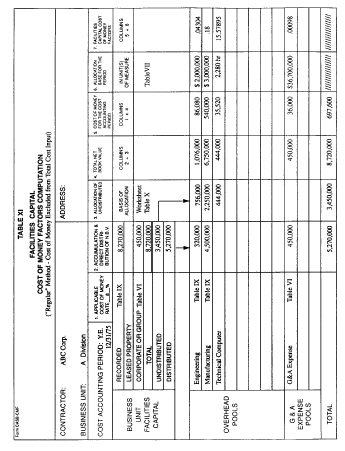
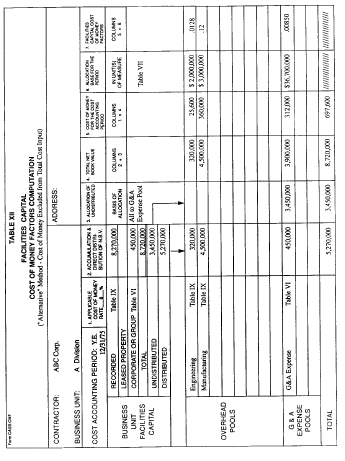
Table XIII - Summary of Cost of Money Computation on Facilities Capital
[Cost of money excluded from total cost input]
| Allocation base | Allocated to contract, table VIII | Computation using regular facilities, capital cost of money factor, table XI | Amount | Computation using alternative facilities capital, cost of money factor, table XI | Amount |
|---|---|---|---|---|---|
| Engineering labor | $330,000 | 0.04304 | $14,203 | 0.0128 | $4,244 |
| Manufacturing labor | 1,210,000 | .18 | 217,800 | .12 | 145,200 |
| Technical computer time | 1 280 | 15.57895 | 4,362 | ||
| Cost input | $5,369,000 | .00098 | 5,261 | .00850 | 45,636 |
| Total cost of money on facilities capital | 241,626 | 195,060 |
1 Hours.
Variation II - Total Cost Input Allocation Base Includes Cost of Money
Table XIV - Recomputation of “A” Division Total Cost Input To Reflect Inclusion of Cost of Money
| (a) Regular method: | |
| Total cost input per table VII | $36,700,000 |
| Cost of money applicable to facilities capital identified with overhead pools per subtotal in column 5, table XV | 661,600 |
| Total cost input including cost of money | 37,361,600 |
| (b) Alternative method: | |
| Total cost input per table VII | 36,700,000 |
| Cost of money applicable to facilities capital identified with overhead pools per subtotal in column 5, table XVI | 385,600 |
| Total cost input including cost of money | 37,085,900 |
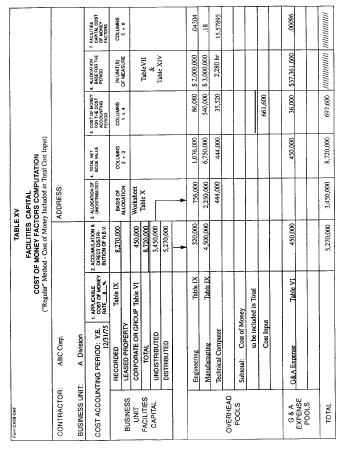
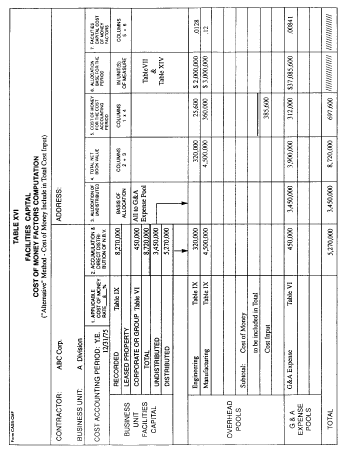
Table XVII - Summary of Cost of Money Computation on Facilities Capital
[Cost of money included in total cost input - regular method]
| Allocation base | Allocated to contract, table VIII | Computation using regular facilities, capital cost of money factor, table XV | Amount |
|---|---|---|---|
| Engineering labor | $330,000 | 0.04304 | $14,203 |
| Manufacturing labor | 1,210,000 | .18 | 217,800 |
| Technical computer time | 1 280 | 15.57895 | 4,362 |
| Cost of money related to overheads | 236,365 | ||
| Cost of money above to be included in cost input | 236,365 | ||
| Cost input, table VIII | 5,369,000 | ||
| Cost input including cost of money | 5,605,365 | .00096 | 5,381 |
| Total cost of money on facilities capital | 241,674 |
1 Hours.
Table XVIII - Summary of Cost of Money Computation on Facilities Capital
[Cost of money included in total cost input - alternative method]
| Allocation base | Allocated to contract, table VIII | Computation using alternative facilities, capital cost of money factor, table XVI | Amount |
|---|---|---|---|
| Engineering labor | $330,000 | 0.0128 | $4,224 |
| Manufacturing labor | 1,210,000 | .12 | 145,200 |
| Cost of money related to overheads | 149,424 | ||
| Cost of money above to be included in cost input | 149,424 | ||
| Cost input, table VIII | 5,369,000 | ||
| Cost input including cost of money | 5,518,424 | .00841 | 46,410 |
| Total cost of money on facilities capital | 5,518,424 | 195,834 |